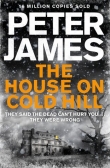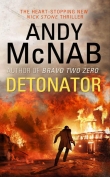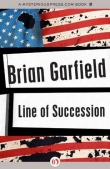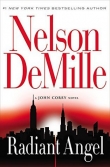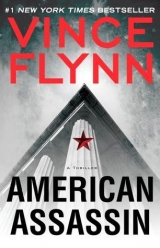
Текст книги "American Assassin"
Автор книги: Vince Flynn
Жанры:
Триллеры
,сообщить о нарушении
Текущая страница: 11 (всего у книги 26 страниц)
CHAPTER 24
THE handsome young man loosened his tie and nudged his beg toward the Customs desk at John F. Kennedy Airport. He casually, yet carefully studied the face of every officer who was checking passports and clearing people through customs. He had a U.S. passport and thus was spared the more stringent and crowded queues that were serving foreigners seeking to visit the United States. He chose this particular line, not because it looked like the fastest, but because the officer manning it looked to be the oldest and most uninterested of the six currently on duty. When it was his turn he stepped to the elevated desk and slid his passport across the cheap blue laminate surface.
The officer, a fifty-some-year-old gray-haired man, gave him a serious look and then glanced at the passport. He was all business. In a voice devoid of real interest he asked, “Did you have a good trip, Mike?”
The man gave a relaxed shrug and said, “Business.”
“What do you do?”
“Computer software. Workforce management stuff.”
The man asked a few more standard questions before getting back to his second one. “Workforce management … what’s that?”
“Sorry … scheduling software. They tell me workforce management sounds more cutting edge.”
The officer let out a small laugh while he applied the appropriate stamps. He closed the passport, slid it back across the surface, and said, “Have a nice day.”
“Thanks, you, too.” The software salesman headed for the main door and a connection to one of the domestic terminals. He was just another man in a blue suit, white shirt, and burgundy tie trying to earn a living. Other than the fact that he was tanned and fit, there was nothing that made him stand out. He found a stall in the men’s room outside the Delta ticketing desk. He carefully pulled back the magnetized liner on his black Travelpro carry-on bag. He deposited the passport for Mike Kruse along with a wallet stuffed with matching credit cards, a Maryland driver’s license, a bent and tattered UVA college ID, and a brand-new Blockbuster card.
He extracted a thin money clip with just one credit card, a Virginia driver’s license, and eight hundred dollars in cash. After closing the suitcase, he left the men’s room and proceeded directly to the Delta ticket counter, where a very enthusiastic young woman with a southern accent asked how she could be of service.
“I’d like to purchase a ticket on your next flight to Dulles.” He placed his driver’s license on the counter.
The woman was already pecking away at her keyboard. She nodded at her screen and then looked at the license. “Well, Mr. Rapp, we have a flight that leaves in one hour and forty-eight minutes.”
She went on to give Rapp the time of arrival and cost of the ticket plus tax. He simply smiled and slid four hundred-dollar bills across the counter. Three minutes later he was on his way with his change and ticket. He’d spent the last three days traveling across Europe pretending to be someone else. He was relieved to be back on U.S. soil, but was not naive enough to think that his problems were over.
He’d taken a roundabout way back to the flat after he’d executed Sharif, and he’d forced himself to run at a much slower pace than he was used to. A man running a sub-five-minute mile in any city of that size would look as if he were running away from something. Back at the flat, Rapp snapped on the latex gloves and wiped down and disassembled the Beretta. He placed the magazine, slide, and frame back in the worn leather suitcase along with the surveillance kit. He locked the case and put it back in the armoire under the pillow and blankets. The barrel and firing pin were tightly rolled up inside the running jacket and placed in a brown grocer’s bag. The rest of the clothes that he’d worn to the park, including his shoes, were placed in a second grocer’s bag.
Rapp took a fast shower and put on his suit. After taking two minutes to walk through the flat and make sure he wasn’t missing anything, he stuffed the two paper bags in his black duffel and attached the duffel to the top of his black, wheeled carry-on suitcase. Forty-one minutes after executing Sharif, Rapp locked the apartment and headed for the tram. The closest stop was three blocks away and Rapp had two major decisions to make.
The first was to find the right place to dispose of the two brown bags and to do it quickly. The second decision involved getting out of the country. Three different plans had been researched. The first was to simply fly out of the country, the second was to take the train, and the third was to rent a car. Rapp did not like the car rental as an option unless it was to be used to drive to Ankara, eight hours away, where he would leave it at the airport and grab a flight. Using the car to cross the border would create a different set of problems that he wanted to avoid. It put a name in a system that the police could trace. It would be a fake name, of course, but even the false identities that they had manufactured were to be protected. Heading straight for Istanbul’s airport would be the faster way out of the country, but it would also involve standing in close proximity to a large number of police, who he didn’t think had a description of him, but he couldn’t be sure.
A half block from the tram stop he ducked into a bakery and purchased a coffee, newspaper, and breakfast roll. He paid in liras and took the coffee black and in a to-go cup. Outside he removed the lid, blew on the hot coffee, and watched a nearby public garbage can. He had enough credits left on his tram card that he didn’t need to worry about buying a new ticket. The digital readout above the stop told him he had two minutes before the right tram arrived. Rapp put the lid back on his coffee and partially opened the black duffel bag. He extracted the more damning of the two paper bags and stuffed it under his left arm.
The hum of the approaching tram caused everyone to look, and that was when Rapp moved. He headed toward the flock of passengers who were waiting to board, pausing for a split second near the garbage can. He released the suitcase, grabbed the bag and stuffed it in the big circular receptacle. The tram stopped, the throng moved forward in unison, and ten seconds later they were all on their way to Sirkeci Station.
When they pulled into the grand old home of the Orient Express, Rapp searched the crowd for police officers who were showing unusual signs of alertness. There were none to be seen, which he took as a good omen. He exited the train and went straight to the nearest kiosk. Rapp had the departure times for Greece and Bulgaria memorized and knew that the express trains for both countries left in the evening. Hanging around the busy transportation hub for the rest of the day just to grab an express train was foolish. It was better to start working his way toward the border. A train was leaving for Alpullu in fifteen minutes. Rapp bought his ticket and made a quick stop at a bank of pay phones. He punched in the long series of numbers and then, in Arabic, left the coded message that would tell Richards and Hurley to not bother coming to Istanbul. Then, threading his way through the busiest part of the terminal, he slid past a trash bin and got rid of the second paper bag that contained his running gear.
After that he found the right platform, boarded his train, and took his seat. He pretended to read the newspaper, while keeping a close eye on the platform. When the train finally pulled out of the station, Rapp relaxed a touch with the comforting thought that he was putting distance between himself and the crime. Distance, he had been taught by Hurley, was your greatest ally and your number-one objective after taking someone out. As the train rolled through some of Istanbul’s less desirable neighborhoods, he thought of Hurley. The man would lose it when he retrieved the message.
Rapp spent the rest of the afternoon hopping westbound trains until he crossed the Greek border at two in the afternoon. The Greeks and Turks did not have good relations, diplomatic or otherwise, so for all intents and purposes he was safe. He was sick of riding in trains and listening to other people yammer, so he decided to rent a car. It would be returned at the Macedonia International Airport in Thessaloniki, and as long as he didn’t kill anyone in Greece, no one would care that an American by the name of Mike Kruse had rented a crappy little red, four-cylinder Flat.
Rapp pointed the tin can south and headed for the coast. As he neared the ocean he cracked the window and smelled salt air. The landscape before him didn’t look anything like the travel brochures he’d thumbed through back at the rental agency. The city of Alexandroupolis lay before him, an industrial fishing village with a few archeological sites of significance. Istanbul it was not. It was gray and brown and dirty and dead and it didn’t affect his mood one bit. Rapp was not the kind of person who allowed geography or climate to depress him—as long as he didn’t have to stay in one place too long. He rolled through Alexandroupolis just before sunset and continued up the coast for another fifteen kilometers until he found a small light blue seaside hotel. It was off season so the place was not busy and the rate was cheap. Rapp wheeled his bag straight into the reception area, which also doubled as the bar and dining room.
A heavyset, older gentleman waved to Rapp from behind the bar. Rapp walked over and the two of them worked out the details in broken English. The proprietor then held up a bottle of liquor and asked Rapp if he would like a drink. Rapp wondered for a brief second what Hurley and Richards were doing in Athens, and then decided that a drink was a great idea. He ordered a beer. The barkeep placed a bottle of Mythos in front of him along with a full bottle of ouzo and two shot glasses. He filled both glasses and slid one closer to Rapp. It was the beginning of a long night.
Three beers, and as many shots, into the evening, Rapp looked at the house phone and considered calling Hurley at his hotel. He dismissed the idea as a bad one and ordered some dinner. Fortunately, two college kids from England showed up and the bartender now had to divide his attention among the three of them. Four beers and a few more shots later, Rapp looked up and caught a reflection of himself in the mirror. It was at that exact moment that he realized a killer was staring back at him. He studied the reflection for a long moment and then held up a shot glass filled with ouzo. He toasted the man in the mirror and went to bed. He did not awaken until almost noon the next day.
CHAPTER 25
VIENNA, VIRGINIA
THE world headquarters for International Software Logistics, Inc., or ISL, was located in a new office park on Kingsley Road. The campus, as the developers called it, consisted of five buildings. They were all made of brown brick and reflective glass. Three of the buildings were strictly office space while the other two were a mix of office and industrial. The developers were an LLC out of the Bahamas who had quietly set aside the southernmost building for Software Logistics. It was at the far end of the office park and it backed up to a ravine. Nice and private. The building had twenty-two thousand square feet of space. The front quarter was built out with a reception area, six offices, a conference room, an area for cubicles, a break room, and a bathroom. The warehouse occupied the remainder of the space and for the most part sat vacant. There were plans, however, to do some expansion.
Stansfield looked at the building through the windshield of a Dodge Caravan and suppressed his concern. These front companies were laborious to set up. The LLC he was part of had directed legitimate funds into the development of this piece of land. The other owners were like-minded men of his era who had made millions and now in that final season of their lives were suddenly very concerned with where their country was headed. All five of them had fought in World War II under the command of Wild Bill Donovan, who ran the Office of Strategic Services. After the war they went on to have successful careers in defense, politics, finance, and in Stansfield’s case, espionage. He went to great lengths to make sure they were protected should the Orion Team ever be exposed. But they all understood that if you were going to run an effective clandestine operation you actually had to lock horns with the enemy and possibly get your hands very dirty.
Kennedy told him she could handle the meeting, but he had his doubts. It wasn’t that he didn’t think her capable. While it was perfectly fine to send people off with messages, words had a funny way of being interpreted differently by different people, often in a way that gave them the outcome they were seeking. And there was a very real chance that his old friend would steamroll her. Even so, his desk was full and he did not want to go through the deceptions it would take to actually get to the meeting.
Kennedy left his office and Stansfield began to systematically move through the stacks on his desk and map table that required his close attention. As the afternoon ticked away he periodically found himself staring out the window thinking about the new recruit. There was something about this Rapp fellow. He hadn’t seen any of his people this fired up about anything in a long time. The kid was either a diamond in the rough or a disaster waiting to happen, depending on who you listened to. Kennedy was possibly biased by the fact that he was her find and Hurley was surly on a good day and an intolerable bastard on a bad day, so it was hard to see who was right. Lewis was steady, analytical, and unfortunately had no desire to run things. He had no doubt that Kennedy was right for the job, but she needed a few more years under her belt before she would be ready.
Stansfield stewed over their personalities for a good five minutes and then decided he needed to go to the meeting. The outcome was preordained. Hurley had never liked this Rapp fellow, and while Kennedy and Lewis were formidable, Hurley would wear them down with his bombastic, stubborn ways. And in truth, it was his call. As the person in charge of field ops he needed to be able to trust his men without question. Stansfield became stuck on the team concept for a second. Through all of the bickering and managing of egos, they had lost sight of one very important fact—the new recruit had not only succeeded, but had done so on his own. He arrived in Istanbul and less than twenty-four hours later he had successfully removed a very nasty thorn in America’s side. There were a number of allies who would be cheering Sharif’s death as well, and Stansfield hoped that at least one of them would be blamed. As much as Stansfield would love to take the credit for the assassination of Istanbul’s merchant of death, he couldn’t. The Orion Team needed complete anonymity or they risked investigation and exposure, which would in short order render them useless. That was why these new recruits could have no link whatsoever to Langley.
But what was the sense of any of it if you didn’t engage the enemy and make him bleed? Stansfield had to be cautious with his hopes, though. How much of this was wishful thinking? He had yet to meet the young man. Who was to say this Rapp fellow wasn’t in reality an uncontrollable asset who would eventually blow up in his face? Lewis didn’t think so, and that was worth something, but still Stansfield realized he needed to meet this fellow and find out for himself what he was made of. If he was as good as some of them were saying it would be a tragedy to throw him away.
Stansfield asked his security detail to prepare for the vehicular version of a shell game. Langley kept a number of nondescript, windowless vans in the motor pool for just this type of thing. As the Operations boss, Stansfield did not have to inform anyone of his needs. His security detail only had to show up and take what was available. The detail had access to extra license plates and a variety of magnetized decals to help facilitate the deception. At seven-oh-four they left the back service gate at Langley in a white van with the Red Carpet Linen Service logo on the sides.
They headed for Tyson’s Corner and once inside the busy parking structure, Stansfield was moved to a Ford Taurus. Fifteen minutes later, he found himself standing alone, under a tree next to the main entrance of George Mason University. The Dodge minivan was parked across the street. Stansfield waited for five minutes and then the vehicle flashed its brights. After climbing into the backseat he handed Joe, head of his security detail, a piece of paper with an address on it. The driver memorized the address and handed the paper back to his boss. He briefly consulted his road atlas and then put the car in drive. Five minutes later they were at the office park.
“Joe,” Stansfield said, leaning forward, “take us around back. There’s a call box and a code for the door.”
When they reached the back of the building Stansfield got out and punched in the code. He trusted Joe, but the fewer people who had the numbers, the tighter the circle remained. Stansfield motioned for Joe to pull in and then pressed the big red button to close the door. Four cars and a motorcycle were already parked inside. To the right, shelves, like the kind you’d find in a library, jutted out from the near wall. They were filled with software titles that were legitimately being shipped overseas. To the left were pallets and boxes and then a sea of darkness.
Stansfield headed for the offices and asked Joe to stay with the car. There was a cipher lock on the door. He punched in the four-digit code, leaned into the door, and was immediately aware of loud shouts coming from just ahead.
Stansfield frowned and wondered first and foremost why the conference room hadn’t been soundproofed. He also wondered why these supposed professionals were incapable of keeping their tempers in check. As he stepped into the room, he almost didn’t notice the man sitting at the break table reading a magazine.
“They’ve been at it like that for almost an hour.”
Stansfield recognized the face instantly. “Mr. Rapp, I presume.”
CHAPTER 26
RAPP didn’t know who the man was, but there was something about him that instantly garnered respect. The gray hair, charcoal suit, shiny wing tips, discerning eyes, and the fact that he’d just walked unannounced into the secure building told him he was standing before someone who more than likely had an office on one of the top floors at Langley. After he gave him the onceover, he couldn’t help but think the man reminded him of a more slender version of Spencer Tracy. Rapp decided he’d better stand. He offered his hand and said, “Yes. And you are …?”
Stansfield gave him a grandfatherly smile. “George.”
Rapp studied him with suspicion. “That’s not your real name, is it?”
“No,” Stansfield said.
After a moment Rapp said, “Any chance you’re the guy running this show?”
Stansfield gave him a relaxed smile. “When you get to my age you better be running something, or it’s time to retire. Please sit.” He motioned with his right hand toward the chair Rapp had been sitting in. Rapp returned to his seat. Stansfield smelled coffee and found a pot on the counter. He helped himself. “Would you like some?”
“No thanks.”
After joining him at the break table, Stansfield blew on his coffee and said, “I hear you’ve been making waves again.”
Rapp wasn’t sure how much he should say, so he shrugged his shoulders and kept his mouth shut.
“Would you care to walk me through your decision?”
“What decision would that be?”
“Why you decided to act on your own in Istanbul?”
Rapp’s dark eyes narrowed. He studied the old man for a few seconds. He was in enough hot water for breaking their damn rules. He wasn’t about to break another. “I’m afraid I don’t know what you’re talking about.”
Stansfield grinned. “I’m afraid you do.”
“I’m at a bit of a disadvantage. If you’re who I think you are, you know I can’t discuss any of this with someone unless they give me the green light.” Rapp jerked his head toward the conference room door.
“Good point. You don’t know me, and that’s for good reason, but I know you.”
Rapp gave him a dubious look that changed into a humble one as the silver-haired man recited his life story, including date of birth, Social Security number, parents’ names, a long list of athletic accomplishments, and his relative strengths and weaknesses. It wasn’t until the last part, though, that Rapp began to feel vulnerable.
“Three days ago you used a 9mm Beretta pistol to execute a man at point-blank range. Here and here.” Stansfield touched his heart and then tapped the bridge of his dark glasses. He looked at the door to the conference room and said, “You have one avid supporter, another who thinks you have great potential, and one very forceful detractor. They are in there deciding your fate right now. If you want to continue on your current career path, I am more than likely your best hope. So if you have anything you’d like to say, now is the time to do it.”
That this man knew so many details about his life and was able to recite them, chapter and verse, without a single note, told Rapp all he needed to know. “You seem to have most of the facts.” He carefully turned the question back on George by saying, “I’m sure you’ve formed some opinions.”
Stansfield sat back and crossed his left left over his right. “I’m hearing conflicting stories. That is why I decided to meet you in person.”
“What are the conflicting stories?”
“You appear to be a man who is possibly uniquely suited for this line of work. You also appear to have a hard time following rules, and that, young man, can be a dangerous thing.”
Rapp nodded. It was becoming apparent that Spencer Tracy’s little brother really was the guy who ran this entire show, which meant he needed to get him in his corner, and do it before Hurley sank him once and for all. “Sir, would I be totally off the mark if I guessed that at some point in your career you spent some time in the field?”
Stansfield grinned but did not answer the question.
“And when you were in the field, did things always go as planned?”
Stansfield saw instantly where he was headed. “There’s a big difference between adapting and disregarding orders.”
Rapp nodded and was sullen for a split second. That was exactly what Hurley had screamed at him, with a few colorful words thrown in to boot. If Doc Lewis hadn’t been there, Rapp was pretty certain they would have come to blows.
“To be fair,” Stansfield continued, “I use great caution when I evaluate a decision that someone has made while operating in a high-stress environment.”
The man’s choice of words gave Rapp pause. He considered them carefully and then said, “High-stress?”
“Yes.”
“I’m not sure I’d call it high-stress, sir.”
Stansfield’s eyes sparkled with amusement. “You snuck into a foreign country using a false identity, killed a man at close range, and then made it out of the country all on your own. You didn’t find any of that stressful?”
“The getting-out part … maybe a little, but really only getting out of Istanbul. After that the odds of getting caught were pretty low.”
“Why did you decide to act on your own?”
“I didn’t go to Istanbul thinking that I would handle the job on my own. It happened. It evolved. I saw the opportunity and I took it.”
“What do you mean you saw the opportunity?” Stansfield was keenly interested in the young man’s next words.
“I read the surveillance briefing that the Brits gave us…”
Stansfield held up his hand and stopped him. “Who told you the Brits gave us that report?”
“No one.”
“Then why did you say the Brits gave it to us?”
Rapp shrugged as if to say it was obvious. “I could tell by the way it was written.”
Stansfield nodded for him to continue and made a mental note to revisit the subject later.
“I read the report and there it was … it jumped right off the page.”
“There what was?”
“The opportunity. The report said that the target took his dog to the park every morning. He sat on a park bench and talked on his cell phone while he threw a ball to his little dog.” Rapp turned his palms up and said, “How does it get any easier than that? No bodyguards to deal with, no drivers or armor-plated cars, no security cameras … very few witnesses, and the few who are around are busy living their own lives.”
“And it didn’t occur to you to pass this information on to Stan?”
“It did, but it also seemed like it was too good to pass up.”
“If you’d brought it to Stan, you wouldn’t have been passing it up.”
“You’re not serious.”
“Completely.”
“If I had brought my idea to Stan he would have called me a moron and told me to shut my mouth.”
The young recruit was probably right. “Stan is very good at this type of thing. This is not his first dance.”
“So I’ve been told,” Rapp said, unimpressed.
“You have some problems with Hurley, I hear.”
“Who doesn’t?”
The point was more accurate than not. “Still … he has a lengthy resume.”
“I’m sure he does, but the entire thing was more complicated than it needed to be. The whole idea here is that we are supposed to get in, get it done, and get out without anyone noticing we were there. If we’d stuck with Stan’s plan, we would have followed the guy around for five days and come to the same conclusion that was right there in the Brit report, and our odds of screwing up somewhere … being noticed … would have increased fivefold at least.”
He was probably right, but Stansfield didn’t tell him so. He would have to deal with Hurley later. “When did you read the report?”
“When I got to the safe house.”
“That first night.”
“Yes.”
“And you decided that night that you would handle it on your own?”
“No … I saw the possibility, that was all.”
“And when you decided to go to the park armed the next morning?”
“I thought there was a chance. I wanted to see with my own eyes and then decide.”
“But when you left the safe house you were prepared to kill him if the opportunity presented itself?”
Rapp hesitated and then admitted the truth. “Yes.”
Stansfield took a sip of the coffee and slowly set the mug on the table. “Any other reason why you chose to act on your own?”
“How do you mean?”
Stansfield gave him a knowing grin. “I was your age once … a long time ago. I was asked to do certain things for my country, and until I actually did them, I wasn’t sure I had it in me.”
Rapp looked down and studied the pattern in the gray-and-black carpeting. It was not in his character to be this open with someone he’d just met, especially on a subject like this, but there was something about this guy that made it difficult to be anything but forthright. “I wanted to kill him,” he finally said.
“Revenge?”
Rapp shrugged his shoulders in a noncommittal way.
“Remember … we recruited you for a reason. I know what you went through. I know how you were affected by Pan Am Lockerbie.”
“Revenge, justice … I don’t know. I just know when I left for the park that morning I wasn’t sure, and then as soon as I laid eyes on him I wanted to kill the bastard. I was sick of all the planning and talking. It made no sense that it had to be so complicated.”
Stansfield took off his glasses and looked at Rapp with his gray-blue eyes. “Any other reason that may have pushed you over the edge?”
Rapp looked at the carpeting again. He hadn’t even admitted the next part to himself. At least not fully. Without looking up he said in a soft voice, “I was afraid I wouldn’t have the guts to do it.”
With the understanding of someone who had walked the same path, Stansfield gave him a sympathetic nod. It had been a long time since Stansfield had killed a man, but he remembered the doubt that gnawed at him until he pulled that trigger for the first time. “How do you feel now?”
“How do you mean?”
“Now that you have taken a human life?”
Rapp gave a nervous laugh and checked his watch. “Do you have a few hours?”
“You know laughter is often a defense mechanism used to deflect.”
Rapp thought of Doc Lewis. “I’ve heard that somewhere else recently.”
“This isn’t a good time to deflect.”
Rapp noticed the concern on the old man’s lined face. He fidgeted with his hands and then said, “This isn’t exactly a topic I’m used to discussing.”
“No … you’re right about that.” Stansfield himself had never spoken to a soul about the men he had killed. It simply wasn’t his way. There were others, though, whom he had worked with over the years, who were quite different in that regard. Some spoke with an intensity that was more academic, as if they were simply trying to perfect their craft for the sake of perfection. Others took a more lighthearted or twisted approach to their play-by-play analysis of how they had killed a man. The best ones, Stansfield had always felt, were the ones who kept it to themselves.
“This is very important,” Stansfield said. “How are you up here?” The old man tapped his temple.
“I think I’m fine.”
“No problem sleeping?”
“No, in fact I’ve slept better than I have in years.”
“Good. I want you to understand something very important. Hamdi Sharif chose to get into the arms business, and he knowingly sold weapons to terrorist groups that were going to use those weapons to kill innocent civilians.”
“I know.”
“I am every bit as responsible as you for his death.”
Rapp frowned and gave him a look that said he wasn’t quite buying it.
Stansfield had expected that. “Who do you think sent you on that operation?”
“I don’t know.”
“I did. I was the judge and the jury. You were merely the executioner. Never forget that.” He spoke with intensity for the first time in the entire conversation. He was almost pleading for Rapp to grasp the gravity of what he was saying.
Finally Rapp nodded, even though he wasn’t sure he fully grasped the man’s meaning.
Stansfield stood and said, “Why don’t you go home now?”
“What about their decision?”
“Don’t worry. I’ll smooth things out. Just try not to cause any problems for the next few months.”
